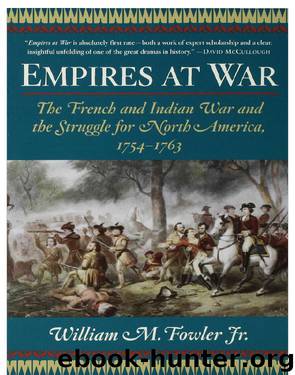Empires at War by Jr. William M. Fowler

Author:Jr., William M. Fowler
Language: eng
Format: epub
Publisher: Bloomsbury Publishing Plc
Published: 1999-12-31T16:00:00+00:00
In 1686 William Penn had negotiated a land cession with the Delaware. The terms were deliberately vague and stipulated that the boundary of the grant was to be the distance a man could walk in a day and a half—about forty miles. More than half a century later, in 1787, Penn's land-hungry successors renegotiated the agreement using the same "one and a half day walk" measure. This time, however, the English purchasers prepared a route and hired a long-distance runner. By the end of the day and a half, he had covered more than sixty-six miles. After a few more "adjustments," the English were able to grab up twelve hundred square miles. When the Delaware protested, the English sought help from the Iroquois, who, in order to curry favor with their allies and enlarge their own empire, obligingly forced their "brothers" off the disputed lands.
Although he styled himself "king of the Delaware," Teedyuscung had no ancestral right to leadership. His skill was in his ability to balance among Delaware, Iroquois, French, and English. Amid a people who valued oratory, Teedyuscung was a star.. Like Pitt in Parliament, he could spellbind an audience with his eloquence, passion, wit, and sarcasm. In 1750 Teedyuscung, without abandoning his own roots, delivered himself and his family to be baptized at the Moravian Christian mission at Gnadenhutten. A few years later he made another political shift to broaden his base of friends: He allied himself with the Iroquois. As the French made their move into the Ohio Valley, Teedyuscung sidled up to them as well. In the violent days following Braddock's defeat, he led his people to war against the British, and for several months Teedyuscung and his warriors ravaged the Pennsylvania frontier. But they never forgot that neither the French nor the English held Indian interests dear.
Post's mission to the Indians went well. They listened to their trusted friend and agreed to gather to hear what the English had to say. In October 1758, all the principals met at Easton, Pennsylvania. At least thirteen of the eastern nations, including all the Iroquois, were present, as were Pember-ton, Post, and George Croghan, representing William Johnson. Teedyuscung also attended, but in the presence of the powerful Iroquois his influence and future were in grave doubt. By coming to meet with the English, the Indians left no doubt that their French connection was broken. For the moment at least, they sought an accommodation in return for their support. During these negotiations Teedyuscung and the Delaware took the biggest loss. They had hoped their claim to lands in Pennsylvania's Wyoming Valley would be recognized, but neither the Iroquois nor the English were willing to do so. Instead the Iroquois, with English support, lorded it over the Delaware, treating them as tenants on their own land. Riding high, the Iroquois asked the Pennsylvanians to pledge that native lands west of the Alleghenies would remain free from white encroachment, which was agreed.26
Download
This site does not store any files on its server. We only index and link to content provided by other sites. Please contact the content providers to delete copyright contents if any and email us, we'll remove relevant links or contents immediately.
| Africa | Americas |
| Arctic & Antarctica | Asia |
| Australia & Oceania | Europe |
| Middle East | Russia |
| United States | World |
| Ancient Civilizations | Military |
| Historical Study & Educational Resources |
Making Haste From Babylon(811)
New York Burning by Jill Lepore(739)
Bunker Hill by Nathaniel Philbrick(703)
An Inquiry Into the Nature and Causes of the Wealth of Nations by Adam Smith(685)
Braddock's March by Thomas E. Crocker(682)
Commonwealth Caribbean Criminal Practice and Procedure by Dana S. Seetahal(634)
The City-State of Boston by Mark Peterson(629)
Infamous Scribblers by Eric Burns(605)
America's Revolutionary Mind by C. Bradley Thompson;(582)
John Adams Under Fire: The Founding Father's Fight for Justice in the Boston Massacre Murder Trial by Dan Abrams(581)
The Barbarous Years by Bernard Bailyn(575)
A Land So Strange: The Epic Journey of Cabeza de Vaca by Andre Resendez(569)
The Wealth of Nations Books I-III by Adam Smith(562)
Bunker Hill: A City, a Siege, a Revolution by Nathaniel Philbrick(558)
American Slavery: A Very Short Introduction (Very Short Introductions) by Heather Andrea Williams(539)
The First American by H.W. Brands(535)
White Slavery In Colonial America: And Other Documented Facts Supressed from the Public Know! by Dee Masterson(535)
The Barbarous Years: The Peopling of British North America: The Conflict of Civilizations, 1600-1675 by Bernard Bailyn(503)
George Washington by John Rhodehamel(501)
